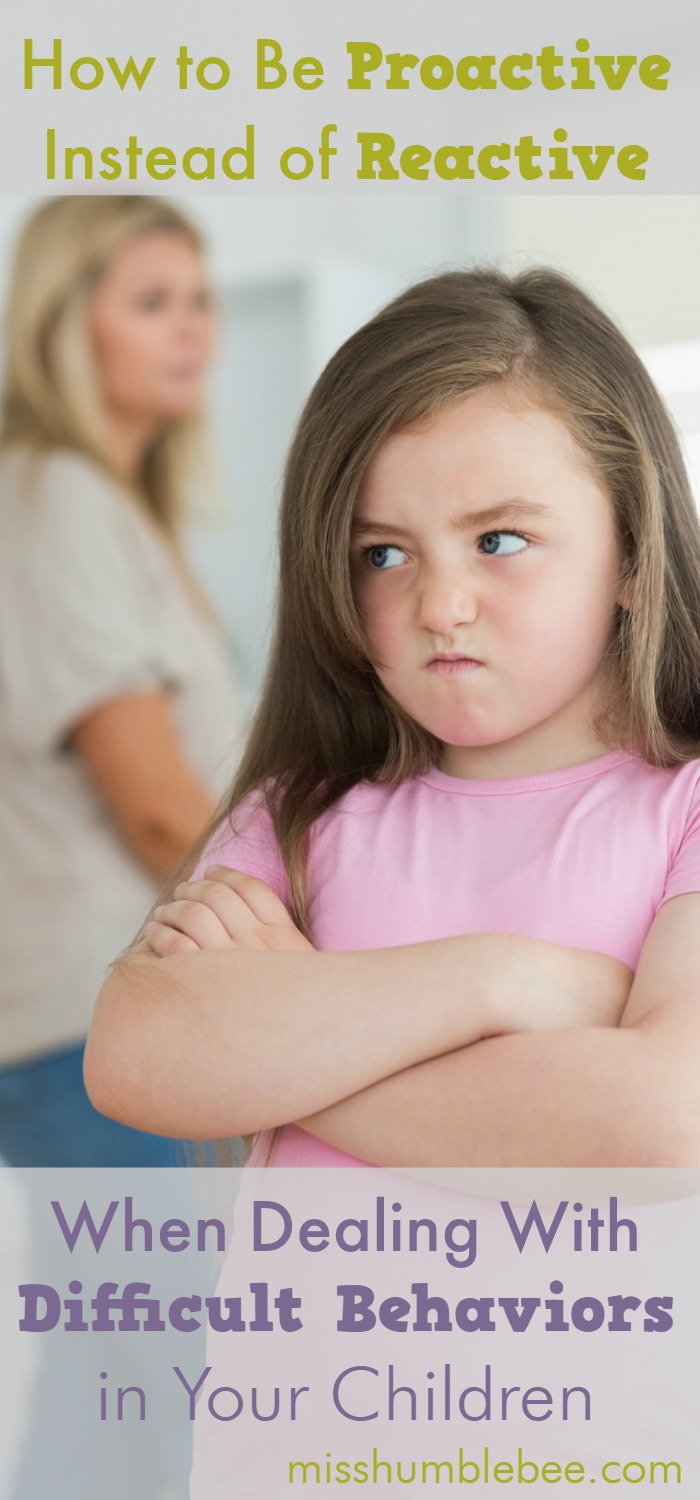Before you had kids, what kind of parent did you think you’d be? What did you think your kids would be like?
Although no parent would claim they expected life with kids to be perfect, those pre-baby dreams are often far more idyllic than reality turns out to be. New parents quickly learn that their offspring are their own little people, with their own personalities, preferences, and trigger points.
As children grow older, these traits only become more apparent, and although it’s amazing to watch your children develop into wonderful people, parents can also find themselves dealing with frustrating and difficult behaviors that they didn’t expect and don’t necessarily know how to handle.

How to Be Proactive Instead of Reactive When Dealing With Difficult Behaviors in Your Children
In the heat of a difficult moment, it can be all too easy to lose your cool. Even the calmest parents have moments like this, but no matter how frequently or infrequently it happens, guilt almost always follows. “If I just hadn’t yelled.” “If I’d taken a deep breath first.” “I really blew it.”
The fact is, no parent is perfect and when situations with your kids start to spiral downward, it’s all too easy to get sucked into the vortex. Unfortunately, that usually ends with a pile of emotional rubble to clean up.
Although it takes time, observation, and work, the key to avoiding these moments with your kids is to be PROACTIVE instead of REACTIVE. How do you do this? These three tips can help:
1. Get to know your child’s triggers
What makes your child cranky? Is it when he’s hungry? Overtired? Overstimulated? Knowing these things is vitally important to being proactive.
For example, if you know your child is more likely to misbehave when he hasn’t gotten enough sleep, you can proactively work to make sure he’s getting to bed at a certain hour each night. There will of course be times when he doesn’t get the sleep he needs, but simply knowing that information allows you to be one step ahead of the problem and far better prepared to handle a situation that begins to arise.
If your child melts down when her blood sugar is low, you may decide to carry a stash of healthy snacks in your purse to curb both her hunger and a tantrum before they begin.
Knowing your child’s trigger points will also help you decide what approach to use when handling a difficult behavior. It’s easier to remain calm and keep the desired end result in mind when you know that a problem behavior is due in part to a need that your child has.
2. Take a moment to think about your child’s day
When you see a storm brewing, it’s helpful to take a few seconds to consider what’s been going on in your child’s day.
What has the day been like for your child so far? Did he just wake up and needs a few minutes of quiet before jumping into the day? Has she just gotten home from a long day of school and needs to let off steam? Did anything happen during the day that may have upset your child?
This information will help you decide how to proceed. As adults and parents, we often try to jump right in and fix it, but that can sometimes make it worse. If your child’s behavior is something that does not need to be handled immediately, sometimes it’s better to offer her time and space to cool down on her own. Or if you realize that something happened that may have upset her, perhaps you can redirect the conversation to that event so you can talk it over together.
3. Consider yourself
It’s easy to jump in as soon as you see your child doing something he shouldn’t, and sometimes that needs to happen. However, how you jump in makes all the difference. Just as you need to consider if your child is hungry or tired and what may have happened in his day that might be making his behavior worse, you should also do the same for yourself.
If you’re tired or have had a particularly stressful day, you may not handle the situation as well as you’d like. Taking a moment to think it over before you do anything is a great way to be proactive instead of reactive. Sometimes simply acknowledging the place you’re in is enough to help you handle the situation in a calm manner. Other times you may need to step back and let another adult handle it, or if no other adult is available, make sure your child is not a danger to herself or anyone else and tell her that you’ll discuss it once you’ve both calmed down.
Although these tips do not cover every reason a child might have difficult behaviors (sometimes we all misbehave for no other reason than that we’re human), they should at least help you consider the fact that what is happening in your child’s life has a direct effect on her behavior. Taking the time and attention to think about these things can calm a tough situation before it gets worse, allowing you to walk away from it without the guilt of knowing you could have handled it better.
By using these methods, you’re also teaching your child the skills she needs to best handle her own emotions and behaviors, which will lead to one of your main goals as a parent: To raise your children into mature adults.











I loved the advise in this article